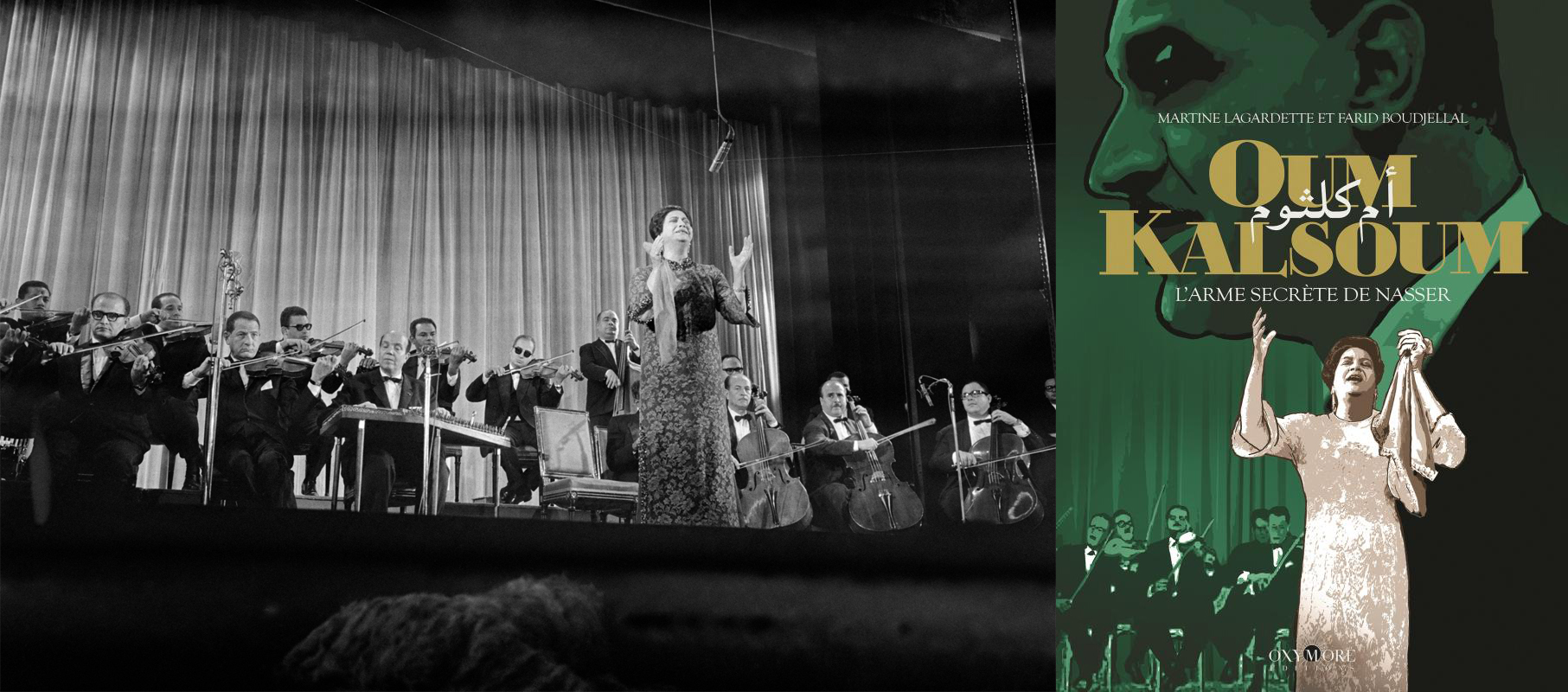On the left: Photograph of Umm Kulthum’s performance at L’Oympia Theater in Paris, 1967. On the right, cover of the graphic novel “Umm Kulthum - Nasser’s Secret Weapon” (Oxymore, 2024) by Martine Lagardette, illustrated by Farid Boudjellal.
Although nearly 50 years have passed since her death, Egypt’s beloved diva, Umm Kulthum, has continued to captivate generations. One can still hear her alluring voice emanating from cafes and car radios in the streets of Egypt or find photographs from her famous performance at Paris’ L’Olympia Theater sold as merchandise. She has consistently remained in the spotlight long after her death, with new books and other artistic homages giving a retrospective of her life and career.
In 2023, two biographies shed light on the singer’s life: “Umm Kulthum and the Years of War Effort” (published in Arabic) by Karim Gamal, a close look into Umm Kulthum’s political activity during and after the 1967 war and “Umm Kulthum: Poetry and Singing” by Egyptian academic Ahmed Youssef Ali. On the theatrical stage, the musical production “Umm Kulthum & The Golden Era” written by Mona Khashoggi has shared the late singer’s story as a self-made star in a patriarchal society in numerous performances, premiering in 2020 at the London Palladium, the Dubai Opera in 2020, and most recently, the Bahrain National Theater in January 2024. This year, Western interest in the Egyptian star’s life continues to be a pleasant surprise with the publication of a French graphic novel, “Umm Kulthum - Nasser’s Secret Weapon” (Oum Kalsoum - L'Arme secrète de Nasser, Oxymore 2024) by Martine Lagardette, illustrated by Farid Boudjellal. The book dives into one of the most famous moments in the late singer’s life, the sold-out L’Olympia concerts in Paris in 1967, just months after the 1967 Arab defeat.
Despite the wealth of material written about her, sources on Umm Kulthum’s birth date vary. Some records cite May 4, 1904, while Ahmed Youssef Ali’s recent biography “Umm Kulthum: Poetry and Singing” (2023) writes 1898. Born in the rural village Tummay al-Zahayrah northeast of Cairo, Fatima Ibrahim al-Sayyid al-Beltagy, Umm Kulthum’s real name, came from a low-income family. (Umm Kulthum, the name she has since become known by, was derived from the name of one of the Prophet Muhammed’s daughters.) Umm Kulthum learned to sing by watching her father instruct her older brother. Her father, Ibrahim al-Beltagy, was a village imam who sang traditional religious songs at celebrations around the countryside to make ends meet. Her mother, Fatmah al-Maliji, was a housewife.
Egyptian society considered singing a “disreputable occupation,” especially for women, according to ethnomusicologist Virginia Danielson, who wrote a book on the singer. Dressed in a boy’s coat and Bedouin headdress that left only her eyes and mouth visible, Umm Kulthum accompanied her father and made a name for herself, accruing a following in the towns and villages of the delta and becoming the family star by her teenage years. In the words of Tom Faber in the Guardian, “Freed from the limitations of gender, her talent shone, and she attracted the interest of noted musicians, who invited her to Cairo.”
Excerpted from Naomi Pham's "From Humble Roots to Self-Made Star: Undefeated by Time, Cultural Icon Umm Kulthum Captivates Arab and Western Interest Half a Century After Her Death,” which appeared in Al Jadid, Vol. 28, No. 85, 2024 and Inside Al Jadid Reports, No. 75, 2024.
Copyright © 2024 AL JADID MAGAZINE

